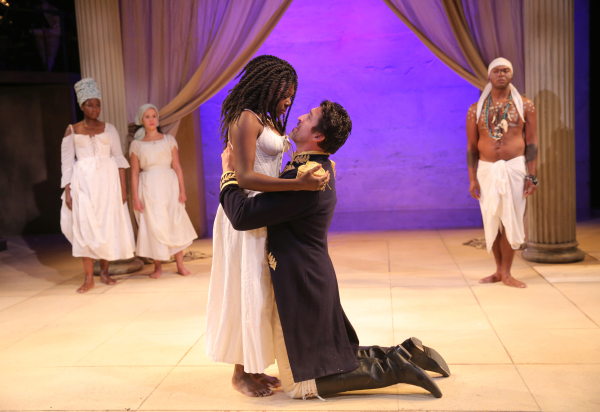Antony and Cleopatra

(© Joan Marcus)
History repeats itself, whether you learn its lessons or not. That's the biggest takeaway from Tarell Alvin McCraney's production of William Shakespeare's Antony and Cleopatra at The Public Theater. With the support of Miami's GableStage and London's Royal Shakespeare Company, McCraney (Choir Boy) has set his production in colonial Haiti. It's a sweaty, sexy Antony and Cleopatra that reaches an early boiling point then unfortunately cools to lukewarm as the show progresses.
The story of Antony and Cleopatra has been enshrined onstage, in film, and in the history books: Roman general and triumvir (meaning he controls one third of the "civilized" world following the death of Julius Caesar) Mark Antony (Jonathan Cake) is madly in love with Cleopatra (Joaquina Kalukango), the queen of Egypt. When dissident General Pompey (Ash Hunter) threatens Rome, Antony returns to Italy to meet with the two other triumvirs, Lepidus (Henry Stram) and Octavius Caesar (Samuel Collings). In an effort to solidify their alliance, Antony marries Caesar's sister, Octavia (Charise Castro Smith), infuriating Cleopatra. The triumvirs come to an accord with Pompey, a peace that the perfidious Caesar quickly violates in a power grab. Meanwhile, Antony returns to Egypt and crowns himself ruler of the East, alongside Cleopatra, and names his sons the "kings of kings." This gives Caesar a pretext to invade Egypt. (Romans hated the concept of "Kings," but oddly enough, they were OK with "Emperors.") Caesar amasses a navy outside of Alexandria, challenging Antony to a battle. Despite the urging of his lieutenants to stay on land, Antony disastrously goes to war at sea at the insistence of his Egyptian Queen.
While director McCraney uses Shakespeare's language and story, the setting of the play is undoubtedly the Caribbean in the late-18th, early-19th centuries, a seascape of constantly shifting alliances and conflicts between the great powers of France, Britain, and Spain. This was a time when Toussaint Louverture led a slave rebellion against France that resulted in an independent Haiti. It also led to his death in a French prison in 1803 after he was captured by Napoleonic forces.
Gentle drum and guitar music greets you as enter the theater. (The music, composed by Michael Thurber, is a constant and welcome presence that enriches the story.) A shallow upstage pool of columns represents the blue-green sea. A sheer white cloth seems to waft in the sea breeze high above the stage. Tom Piper's costumes are a feast of puffy white shirts, perfectly tailored martial overcoats, and knee-high riding boots. Voodoo makeup and African headwraps accent this European style to create something distinctly Caribbean. As always, Cleopatra is dripping with gold and jewels.
Kalukango exudes the spirit of Cleopatra with her unpredictable and tempestuous performance. In contrast, Cake's Antony is a wimp, thoroughly unmanned by love. Sure, the script dictates that he foolishly follows after Cleopatra's fleet, ceding the sea to Octavius, but does that mean he has to be such a constant weepy mess of adolescent tears? There is none of the earthy, sexy bravado in Cake's Antony that we would expect after a viewing of Julius Caesar. This overflow of pathos makes him awfully unsympathetic.
Collings' Octavius has a satisfyingly evil British accent and a calculating demeanor. Appropriately, this high-strung political operator is the shortest man onstage. When he emerges triumphant over Pompey with a crown of golden leaves and a toga draped over his military coat, he is strikingly reminiscent of Napoleon Bonaparte.
As the Soothsayer, Chivas Michael is this production's MVP. Singing in Creole, his hauntingly beautiful voice conveys much of the music with a sadness befitting this epic tragedy. We look forward to his songs with increasing anticipation, mostly because the script starts to drag as Antony and Cleopatra's grisly doom becomes inevitable. Despite his considerable talent in creating a visually and aurally sumptuous production, McCraney is unable to lead his cast beyond performances that are largely two-note: sad and shouty.
While the drama is hot and cold, the setting still offers plenty to consider: The political instability of the second triumvirate paved the way for Octavius Caesar to become Emperor of Rome. Similarly, the chaos of the French Revolution gave way to Napoleon (who also styled himself "Holy Roman Emperor"). As Russian forces surround strategic positions in a politically divided Ukraine, seemingly in an attempt to provoke an attack (in much the same way Octavius drew Antony's forces out to sea in Egypt), this timeless story looks poised to recur once again.










